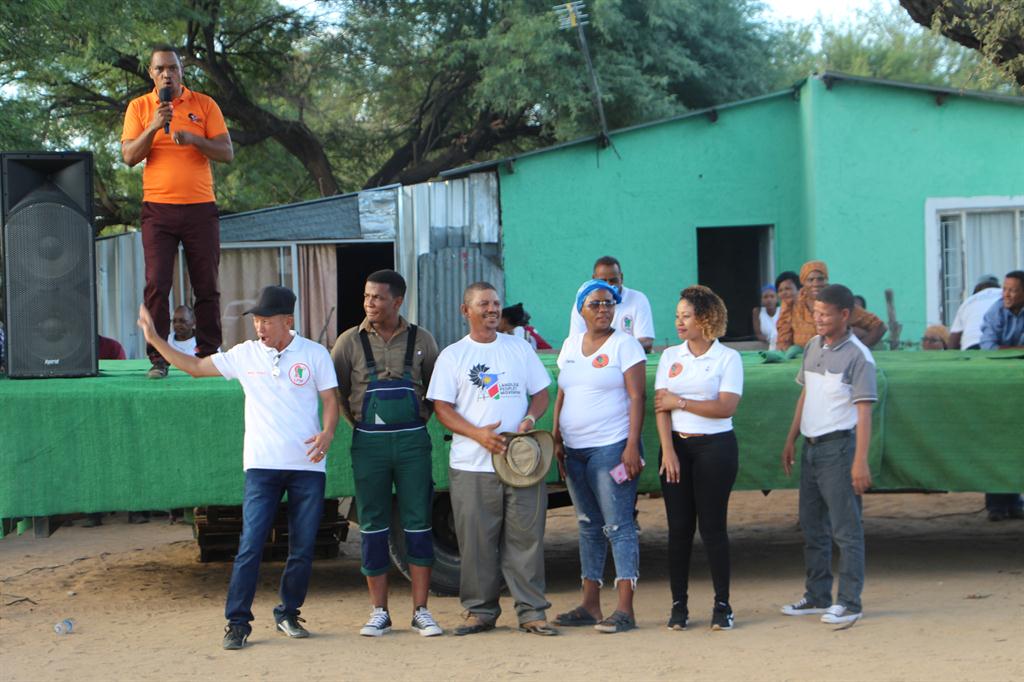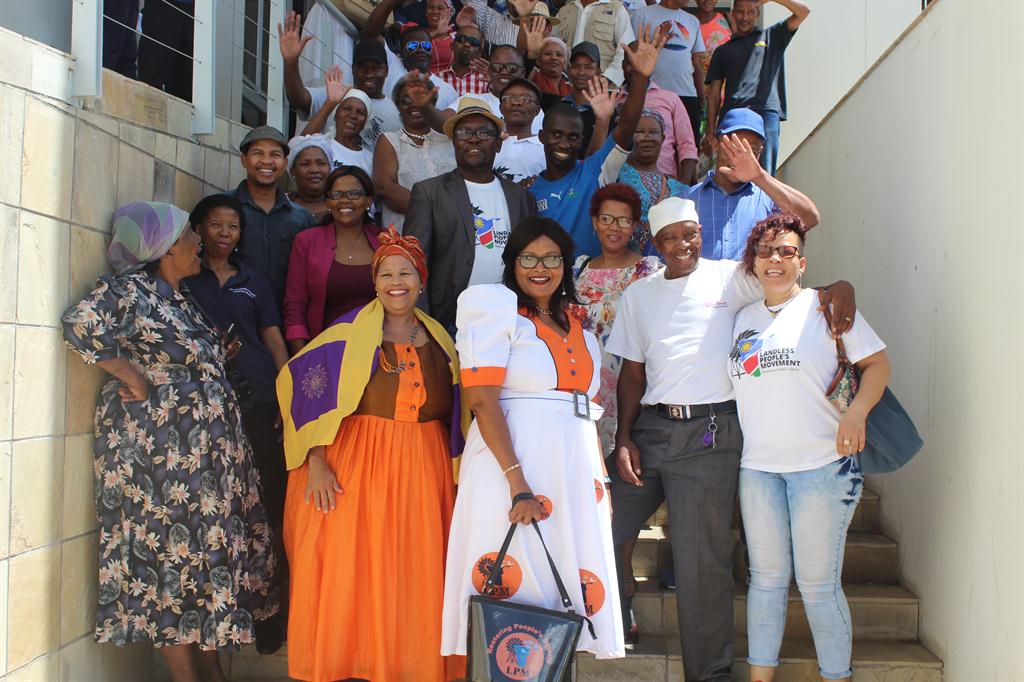When things go south
When former Swapo youthful firebrand Bernadus Swartbooi lost his deputy minister's post, amid the washing of dirty laundry linked to government's land resettlement process, unbeknown to his then political masters, the Landless People's Movement (LPM) was birthed as a vehicle for his political aspirations.
Frank Chikane's book 'Eight Days in September: The Removal of Thabo Mbeki' gives a riveting, behind-the-scenes account of the removal of Mbeki as the neighbouring country's head of state in September 2008. Chikane is a former director-general in the South African presidency.
Namibia had a recent lite version of this kind of political intrigue and drama when the then deputy minister of land reform, Bernadus Swartbooi, was booted out of his post in December 2016.
Unbeknown to the general public, while Swartbooi stayed on as Swapo backbencher, a political vehicle had already been started in the form of the Landless People's Movement (LPM), which Swartbooi took over when he was finally recalled as a Swapo MP in the middle of 2017.
This movement was later transformed into a political party that will be contesting the 27 November general election, with Swartbooi, the former //Karas governor, as its presidential candidate.
Nujoma vs Swartbooi
The tensions between Swartbooi and his then senior in the ministry, Utoni Nujoma, had burst into the public domain at a meeting in Hoachanas, where Swartbooi accused Nujoma of tribal preference when it came to dishing out land under the country's resettlement programme.
He was subsequently summoned to State House where he was given an ultimatum to apologise or resign from his deputy minister post. Swartbooi refused to budge. In fact President Hage Geingob, recalling the meeting with his once fierce supporter, said the meeting was highly charged.
“He stormed out of the meeting and even forgot his cellphone behind,” Geingob, who must now face off with his political prodigal son, once said.
Subsequently, the presidency announced that Geingob had accepted Swartbooi's verbal resignation. In a media release it was announced he would be replaced by Priscilla Boois.
At the time, the political support Swartbooi enjoys in the south came to the fore. His home region //Karas in particular – where he served as governor under the Pohamba presidency - welcomed him back with song and dance.
They idolised his bravery and uncompromising stance on land, a means of production wrestled through gunpowder from some of the country's communities, including Swartbooi's own tribe, the Nama.
That he was prepared to leave a cushy job as both minister and member of parliament only heightened his standing in his community and boosted his stocks as a nonsensical politician.
During a peaceful demonstration Keetmanshoop residents under the leadership of land activist Paul Thomas handed over a petition directed to the president's office at the office of the governor.
“Our cultural and traditional values like the graves of our forefathers, and the plants and objects we use for our traditional practices, are rooted on this land, therefore, by settling others on the land, you are eliminating the Nama people from their roots and culture,” the petition read.
The community further threatened to invade and lock German-owned farms in the south, if government did not urgently address the land concerns raised by Swartbooi.
By February 2017 the fault lines had clearly been exposed. Swartbooi, now an ordinary Swapo MP, called Nujoma 'an idiot' in the National Assembly.
What followed was a continual upping of tensions that were becoming untenable.
In July 2017, Swartbooi was recalled as a Swapo MP.
Then Swapo secretary-general Nangolo Mbumba said the reasons for the recall were evident, as Swartbooi had been inviting it himself through his actions and statements.
A day later, Swartbooi resigned from the ruling party, which he started labelling an Owambo party.
“I hereby publicly announce without any fear or contradictions that I proudly, loudly and publicly leave the Ovamboland People's Organisation [OPO]… when you meet me next time, I am neither an honourable nor a comrade. I am, I was, I will be, till death do me part, Bernadus Swartbooi,” he said at media conference.
“I am free now from OPO - our leaving OPO does not mean when the time comes to represent Namibia, our Owambo people should be left out, they are part of us.”
Political commentator Ndumba Kamwanyah said this week: “Unfortunately, the LPM, ethnically, does not have strong national make-up because it is a party that's interest-driven, which is the ancestral land issue.”
He said ancestral land is an issue affecting mainly people in the south, making the party's support-base regionally and tribally orientated.
“If anything, the party might garner one or two seats in parliament but I don't see anything beyond that two.
Commenting on the sustained perception that the LPM may make inroads into Swapo's support base in the south and where other likely sources of potential votes may come from, Kamwanyah said: “Most certainly, their votes will come from the south and likely they will take votes from Swapo, the PDM (Popular Democratic Movement) and the UDF (United Democratic Front).
“Other regions are a tough climb, especially the four-O regions.”
Asked whether the LPM represents the rise of radicalism and whether it is a one-trick pony, as it arose from the battle over ancestral and other land, Kamwanyah said: “Certainly the party seems to pushing for radical solutions, but that it represents radicalism in this country is still yet to be established.”
Asked if one its potential Achilles heels is that it is based around the cult of personality that Swartbooi represents, Kamwanyah added: “That's a weakness and a pitfall the LPM party must avoid at all costs. They seem to drift in direction of having politics revolve around individuals.”
ASHLEY SMITH AND TOIVO NDJEBELA
Namibia had a recent lite version of this kind of political intrigue and drama when the then deputy minister of land reform, Bernadus Swartbooi, was booted out of his post in December 2016.
Unbeknown to the general public, while Swartbooi stayed on as Swapo backbencher, a political vehicle had already been started in the form of the Landless People's Movement (LPM), which Swartbooi took over when he was finally recalled as a Swapo MP in the middle of 2017.
This movement was later transformed into a political party that will be contesting the 27 November general election, with Swartbooi, the former //Karas governor, as its presidential candidate.
Nujoma vs Swartbooi
The tensions between Swartbooi and his then senior in the ministry, Utoni Nujoma, had burst into the public domain at a meeting in Hoachanas, where Swartbooi accused Nujoma of tribal preference when it came to dishing out land under the country's resettlement programme.
He was subsequently summoned to State House where he was given an ultimatum to apologise or resign from his deputy minister post. Swartbooi refused to budge. In fact President Hage Geingob, recalling the meeting with his once fierce supporter, said the meeting was highly charged.
“He stormed out of the meeting and even forgot his cellphone behind,” Geingob, who must now face off with his political prodigal son, once said.
Subsequently, the presidency announced that Geingob had accepted Swartbooi's verbal resignation. In a media release it was announced he would be replaced by Priscilla Boois.
At the time, the political support Swartbooi enjoys in the south came to the fore. His home region //Karas in particular – where he served as governor under the Pohamba presidency - welcomed him back with song and dance.
They idolised his bravery and uncompromising stance on land, a means of production wrestled through gunpowder from some of the country's communities, including Swartbooi's own tribe, the Nama.
That he was prepared to leave a cushy job as both minister and member of parliament only heightened his standing in his community and boosted his stocks as a nonsensical politician.
During a peaceful demonstration Keetmanshoop residents under the leadership of land activist Paul Thomas handed over a petition directed to the president's office at the office of the governor.
“Our cultural and traditional values like the graves of our forefathers, and the plants and objects we use for our traditional practices, are rooted on this land, therefore, by settling others on the land, you are eliminating the Nama people from their roots and culture,” the petition read.
The community further threatened to invade and lock German-owned farms in the south, if government did not urgently address the land concerns raised by Swartbooi.
By February 2017 the fault lines had clearly been exposed. Swartbooi, now an ordinary Swapo MP, called Nujoma 'an idiot' in the National Assembly.
What followed was a continual upping of tensions that were becoming untenable.
In July 2017, Swartbooi was recalled as a Swapo MP.
Then Swapo secretary-general Nangolo Mbumba said the reasons for the recall were evident, as Swartbooi had been inviting it himself through his actions and statements.
A day later, Swartbooi resigned from the ruling party, which he started labelling an Owambo party.
“I hereby publicly announce without any fear or contradictions that I proudly, loudly and publicly leave the Ovamboland People's Organisation [OPO]… when you meet me next time, I am neither an honourable nor a comrade. I am, I was, I will be, till death do me part, Bernadus Swartbooi,” he said at media conference.
“I am free now from OPO - our leaving OPO does not mean when the time comes to represent Namibia, our Owambo people should be left out, they are part of us.”
Political commentator Ndumba Kamwanyah said this week: “Unfortunately, the LPM, ethnically, does not have strong national make-up because it is a party that's interest-driven, which is the ancestral land issue.”
He said ancestral land is an issue affecting mainly people in the south, making the party's support-base regionally and tribally orientated.
“If anything, the party might garner one or two seats in parliament but I don't see anything beyond that two.
Commenting on the sustained perception that the LPM may make inroads into Swapo's support base in the south and where other likely sources of potential votes may come from, Kamwanyah said: “Most certainly, their votes will come from the south and likely they will take votes from Swapo, the PDM (Popular Democratic Movement) and the UDF (United Democratic Front).
“Other regions are a tough climb, especially the four-O regions.”
Asked whether the LPM represents the rise of radicalism and whether it is a one-trick pony, as it arose from the battle over ancestral and other land, Kamwanyah said: “Certainly the party seems to pushing for radical solutions, but that it represents radicalism in this country is still yet to be established.”
Asked if one its potential Achilles heels is that it is based around the cult of personality that Swartbooi represents, Kamwanyah added: “That's a weakness and a pitfall the LPM party must avoid at all costs. They seem to drift in direction of having politics revolve around individuals.”
ASHLEY SMITH AND TOIVO NDJEBELA






Comments
Namibian Sun
No comments have been left on this article